![]()
Friday, October 9, 2015 | by Vijeta Uniyal
Originally published by Gatestone Institute. Republished with permission.
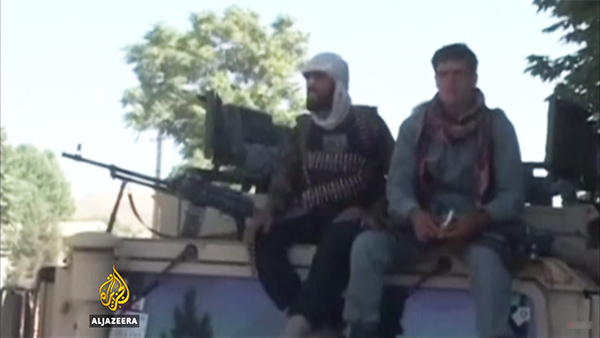
Taliban militiamen sit atop a US-supplied Humvee that they captured from the Afghan Army, after their conquest of Kunduz last week. (Image source: Al Jazeera video screenshot).
The U.S. President who gave up Syria and Yemen without a fight is now leading a half-hearted counteroffensive in Afghanistan. The Taliban seems to have correctly assessed the lack of resolve of the current U.S. leadership, and has evidently decided to retake all of Afghanistan.
In his first presidential campaign of 2008, then-Senator Obama called U.S. engagement in Iraq the “bad war,” and instead wanted his country to focus on Afghanistan — his “good war.”
But after U.S. troops withdrew from Iraq in 2011, large parts of Iraq fell under the control of the Islamic State (ISIS), while the remaining part came under the influence of Iran.
So how is President Obama’s “good war” in Afghanistan going?
On September 29, 2015, Taliban fighters overran Kunduz, a provincial capital. The takeover created the biggest victory for the Taliban since 2001, when an American-led coalition drove the Taliban regime out of power, in the aftermath of the September 11 attacks in New York.
Since its ouster, the Taliban have been lurking in tribal regions, and launching sporadic terrorist attacks in the cities. But the Taliban had never succeeding in retaking a population center. With the fall of Kunduz, the Taliban now controls the fifth-largest city in Afghanistan.
On September 29, Taliban forces launched a coordinated attack on Kunduz from three directions. The Afghan Army failed to offer any significant resistance, and rushed for cover at the city’s airport. Apparently, the Afghan soldiers were hoping for aerial reinforcements from US-led coalition forces. Afghanistan’s Interior Ministry spokesman, Sediq Sediqqi, confirmed that the city of Kunduz had fallen into “the hands of the enemies.”
Despite heavy U.S. airstrikes, the Taliban are evidently well dug in, indicating that the terror militia intends to hold onto its recent territorial gains and has no intention of retreating. Clearly, this Taliban is not the hit-and-run group of yesteryear. It seems to be a reinvigorated Islamist force, bent on conquest, and ready to challenge the U.S. and coalition forces.
Although the Afghan Army, directed by President Ashraf Ghani’s government in Kabul, has failed to mount a counteroffensive against advancing Taliban forces, the blame for the wider military and geopolitical disaster probably deserves to go to Obama.
President Obama never fails to remind the world that he commands “the strongest military that the world has ever known,” and indeed the strength of U.S. military and the courage of its brave men and women are beyond question. But the Commander-in-Chief has failed to show the fortitude required from the leader of the free world.
Additionally, Obama seems to have established a pattern of underestimating America’s adversaries. He famously called ISIS a “jay-vee team,” and recently stated that Russian President Vladimir Putin went into Syria “out of weakness.” But what is visible to everyone except Obama is that this “weak” Putin has been outflanking the United States in Ukraine, Crimea and now Syria. It is Obama who seems weak.
As with his approach elsewhere, Obama has been alienating allies and strengthening foes.
In an apparent attempt to persuade Pakistan to stop supporting Al-Qaeda and its affiliates, President Obama offered to strong-arm India into making concessions on Kashmir. According to Pakistan’s former Ambassador to the U.S., Husain Haqqani, President Obama secretly wrote to Pakistani President Asif Ali Zardari in 2009, sympathizing with Pakistan’s stand on Kashmir and apparently offering to tell India that “the old ways of doing business are no longer acceptable.”
According to the Haqqani’s account, made public in 2013, Pakistan, the recipient of billions of dollars of U.S. financial aid annually, rejected President Obama’s offer. Instead, Pakistan continued to train, arm and shelter international terrorists — including Osama bin Laden. Many of these terrorists directly planned and carried out operations that killed nearly 2,000 U.S. service personnel and wounding 20,000 more.
President Obama thereby alienated India while getting nothing in return from Pakistan.
India would not have need much convincing to back the U.S. strategy in Afghanistan. New Delhi shared Kabul’s concerns over rising Islamic militancy in the region. India also faces an existential threat from Islamic militancy in the Muslim-majority Kashmir province and beyond. Since mid-1990s, more than 30,000 Indian civilians and security personnel have been killed in terrorist attacks.
President Obama, while visiting India, apparently preferred to play the “travelling salesman” for the religion of Islam, repeatedly smacking Hindus for being intolerant to India’s Muslim minority, negating what has appeared the attempted genocide and ethnic cleansing of Hindus that began 70 years ago with the creation of Islamic Republic of Pakistan, and continues to this day. Not only were millions of Hindus forced out of Pakistan when the two countries were created in 1947, but nearly all the remaining Hindus in Pakistan and Bangladesh (formerly East Pakistan) were expelled or murdered during the following decades. The ethnic cleansing culminated in the Bangladesh Genocide of 1971, perpetrated by Pakistan Army. It killed some three million ethnic Hindus and Bangladeshis, and forced more than 10 million refugees to flee into India. By contrast, the Muslim population in India has grown from 35 million in the early 1950s to about 180 million in 2015, making India home to the world’s second-largest Muslim population, second only to Indonesia.
The Taliban’s offensive in Afghanistan is the direct result of the Obama Administration’s consistent policy of alienating friends and emboldening enemies. Be it Israel, Iran, Egypt or Afghanistan, President Obama has evidently preferred dealing with Islamist and jihadist actors, rather than with liberal, secular democratic forces.
The results of a Taliban reconquest of Afghanistan would be even more disastrous than its previous reign of terror. The Taliban would not only resume sending trained jihadists across Pakistan’s border to wage war on “infidels” in India; it would also carry out its declared objective of global jihad against the West. With Europe’s borders now wide open, the West is more vulnerable than ever.
Vijeta Uniyal is an Indian current affairs analyst based in Europe. Follow Vijeta Uniyal on Twitter.



 RSS
RSS


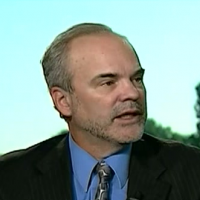
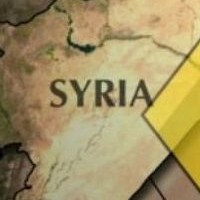
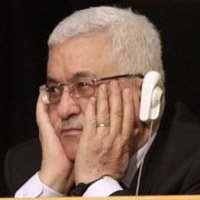
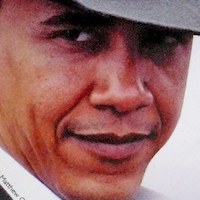










Latest Comments
Hello Mike, Thank you for your positive feedback to the article. I felt there wasn’t too much critical analysis of ...
Thanks for this considered and well constructed article. A follow up article on the manner in which the editorial contro...
THE CLUELESSNESS OF CLAIMING THAT OBAMA'S MIDDLE EAST POLICIES WERE A FAILURE CANNOT BE FURTHER FROM THE TRUTH, WHAT THE...
As long as Obama is the president of the usa do not trust the us government......
Thank you for an good read....